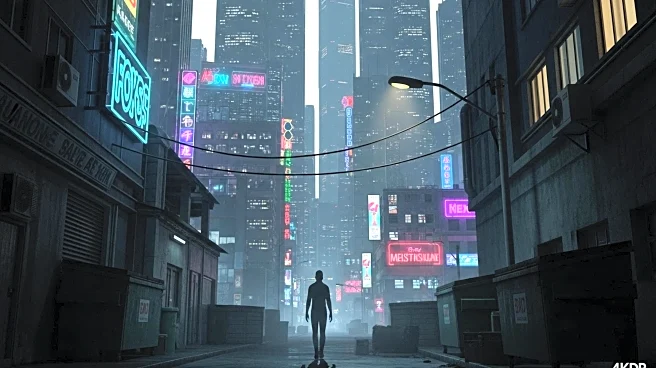What's Happening?
Director Francis Lawrence's latest film, 'The Long Walk,' presents a dystopian thriller set in an alternate United States. Based on Stephen King's novel, the film follows young men drafted into a deadly walking competition, where the last man standing wins a wish and riches. The story centers on Ray Garraty, played by Cooper Hoffman, as he navigates the brutal event alongside other participants. The film explores themes of state violence and personal determination, with Lawrence's direction and Jo Willems' cinematography capturing the tense atmosphere. Despite some world-building flaws, the film's character-driven narrative keeps audiences engaged.
Why It's Important?
'The Long Walk' adds to the growing genre of dystopian films that reflect societal concerns about authoritarianism and individual agency. Lawrence's adaptation of King's novel offers a fresh perspective on these themes, potentially resonating with audiences familiar with his previous work on 'The Hunger Games.' The film's exploration of state control and personal rebellion may spark discussions about current political climates and the impact of government policies on individual freedoms. As a cinematic experience, 'The Long Walk' showcases the power of storytelling to address complex issues, contributing to the cultural dialogue around dystopian narratives.
What's Next?
The film's release may lead to further adaptations of Stephen King's works, given the enduring popularity of his stories. Lawrence's success with 'The Long Walk' could open doors for more projects exploring dystopian themes, potentially influencing the direction of future films in the genre. Audience reactions and critical reviews will likely shape the film's legacy, determining its place within the broader context of dystopian cinema.
Beyond the Headlines
The film's portrayal of a totalitarian state and its impact on young men raises ethical questions about the use of violence and control in society. 'The Long Walk' serves as a cautionary tale, prompting viewers to consider the consequences of unchecked power and the importance of resistance. The film's focus on character dynamics and personal motivations offers a nuanced exploration of human resilience, encouraging audiences to reflect on their own values and beliefs.











